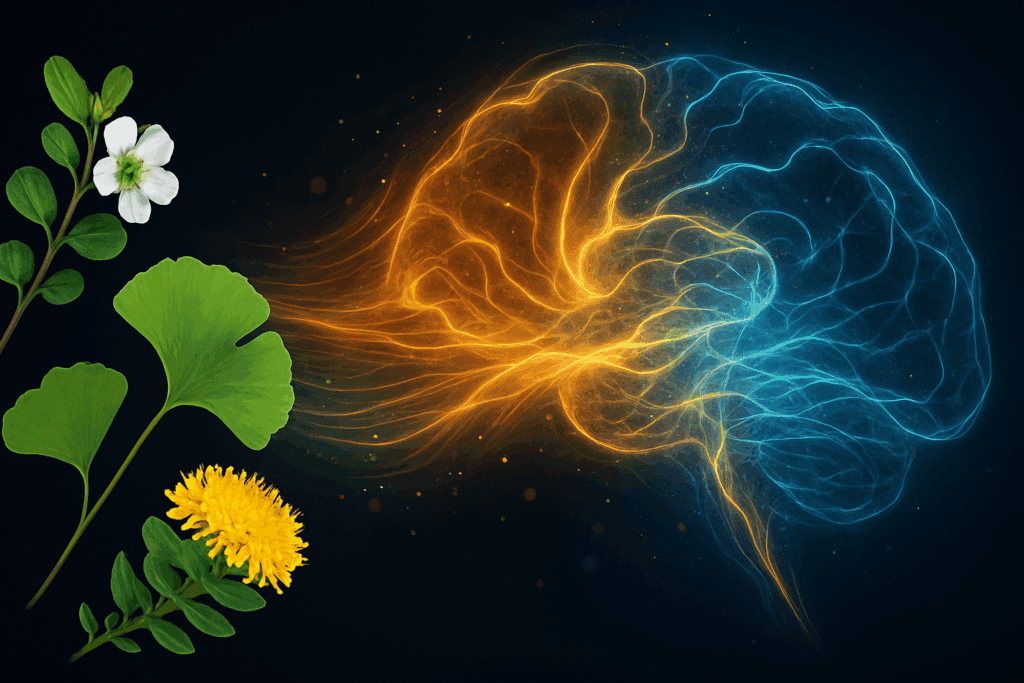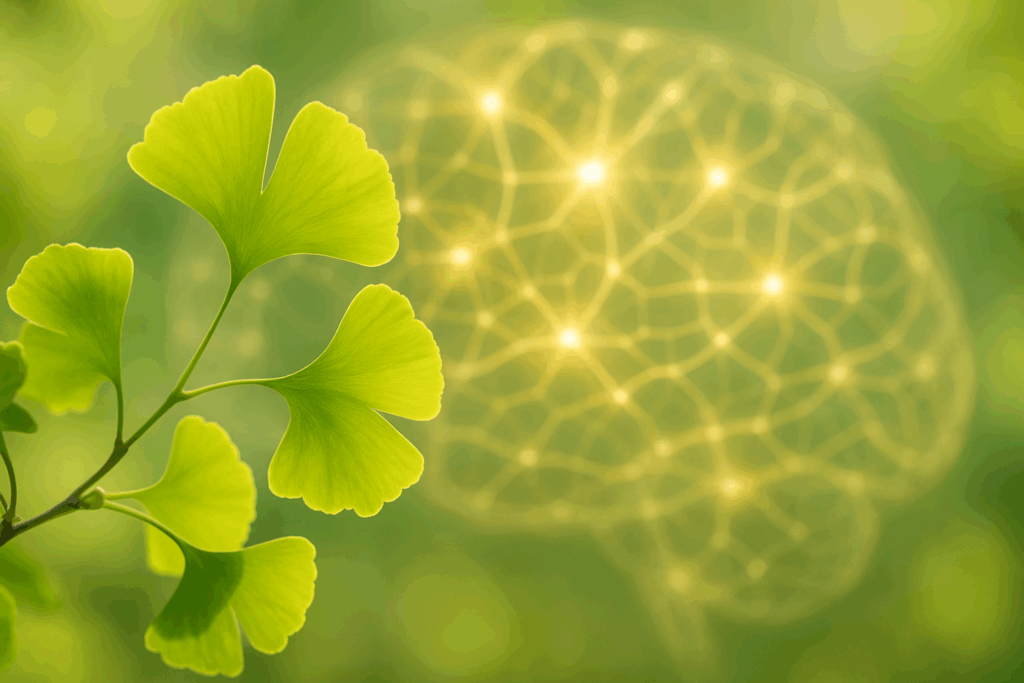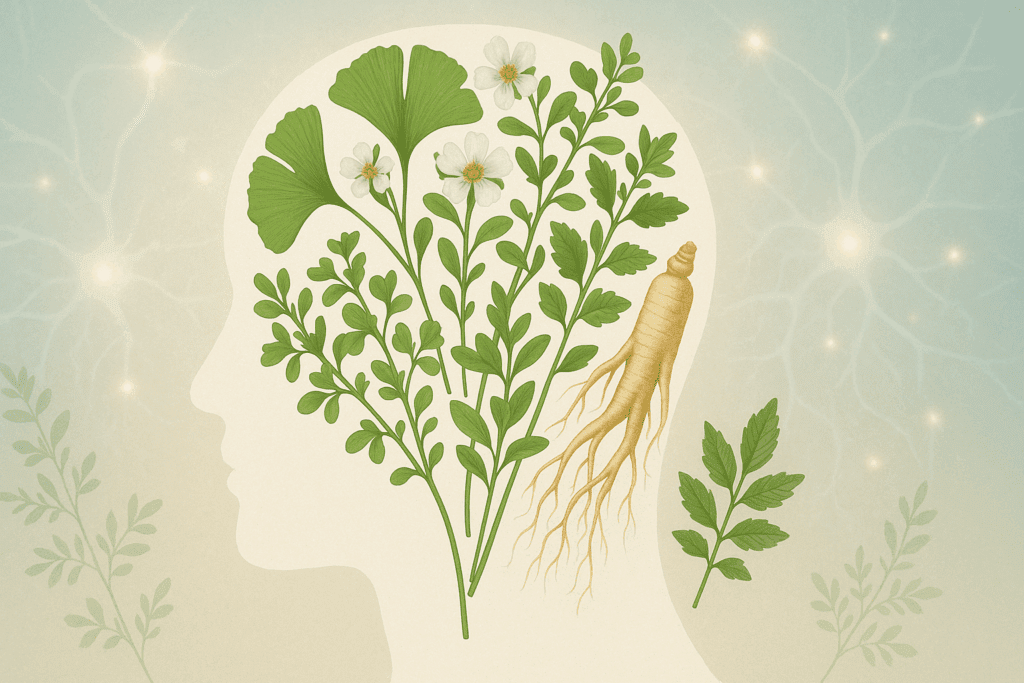Understanding ADHD and the Search for Natural Alternatives
Attention-Deficit/Hyperactivity Disorder (ADHD) is a complex neurodevelopmental condition affecting millions worldwide. Characterized by symptoms such as impulsivity, hyperactivity, and inattentiveness, ADHD can pose significant challenges in academic, professional, and social settings. While pharmaceutical interventions like stimulants and non-stimulants are commonly prescribed, a growing interest has emerged in exploring natural, plant-based alternatives. Particularly for individuals seeking a holistic approach, the search for the best herb for ADHD has become more prominent. Women with ADHD may experience unique challenges, including underdiagnosis and hormonal influences, necessitating tailored herbal strategies.
You may also like: Where to Buy Bacopa Monnieri: How to Find Quality Supplements for Cognitive and Memory Support
The exploration of natural remedies fits well into a broader health-conscious lifestyle. Many individuals who consider herbs for cognitive support also turn to comprehensive wellness strategies, such as taking a brain multivitamin or integrating multivitamins for brain health into their daily routine. These complementary practices reflect a desire not only to manage symptoms but also to optimize mental clarity and emotional resilience.

The Role of Herbal Medicine in Cognitive Health
Herbal medicine has long been recognized across cultures as a source of healing and cognitive support. Ancient systems like Traditional Chinese Medicine and Ayurveda have incorporated botanicals to sharpen focus, enhance memory, and stabilize mood. In modern times, scientific inquiry has begun to substantiate many of these traditional claims, revealing active compounds within herbs that can influence neurotransmitter activity, reduce oxidative stress, and support brain plasticity.
When evaluating herbs for ADHD, it is essential to consider not just symptom relief but also broader cognitive benefits. Incorporating herbs alongside a brain multivitamin regimen can provide synergistic effects, enhancing mental performance while addressing nutritional deficiencies often associated with ADHD. Indeed, selecting the best multi vitamin for memory can lay a foundational platform upon which herbal therapies can build.
Key Considerations When Choosing Herbs for ADHD
Choosing the best herb for ADHD is not a one-size-fits-all endeavor. Factors such as age, sex, hormonal fluctuations, lifestyle, and co-existing medical conditions all influence the optimal choice. For women, the interplay between estrogen levels and neurotransmitter systems such as dopamine can modulate ADHD symptoms, making certain herbs more or less effective depending on hormonal cycles.
Safety profiles are another critical consideration. Natural does not always mean safe, and understanding the pharmacodynamics of herbs is crucial. Just as you would carefully research the best multi vitamin for memory to ensure it meets clinical standards, herbs should be chosen with attention to evidence-based efficacy and potential interactions with other supplements or medications.
Furthermore, dosage, bioavailability, and standardization of active constituents determine the therapeutic potential of herbal remedies. It is advisable to opt for high-quality, standardized extracts that have been tested for purity and potency, similar to the standards applied when selecting premium multivitamins for brain health.

Top Herbal Contenders for ADHD Support
Ginkgo Biloba
Ginkgo biloba, a venerable tree species dating back millions of years, has been extensively studied for its cognitive-enhancing properties. Its unique phytochemical profile, rich in flavonoids and terpenoids, exerts antioxidant effects that protect neuronal integrity. Research suggests that Ginkgo may improve attention span, memory retention, and cognitive flexibility, making it a strong candidate for ADHD support.
Women with ADHD, who often face particular challenges with executive functioning and working memory, may find Ginkgo especially beneficial. Combining Ginkgo supplementation with a brain multivitamin regimen can amplify cognitive improvements, addressing both nutrient gaps and neurovascular support simultaneously. Moreover, when choosing the best multi vitamin for memory enhancement, formulations that include Ginkgo extracts offer an added advantage.
Bacopa Monnieri
Bacopa monnieri, also known as Brahmi, is another botanical powerhouse celebrated for its nootropic effects. This adaptogenic herb has demonstrated efficacy in enhancing memory consolidation, improving attention, and reducing anxiety—symptoms that frequently co-occur with ADHD. Bacopa’s active constituents, called bacosides, support synaptic communication and neuroprotection.
Clinical studies reveal that Bacopa may require several weeks of consistent use to manifest noticeable cognitive benefits. However, the gradual yet profound effects make it a sustainable option for long-term cognitive enhancement. Women navigating ADHD may benefit from Bacopa’s dual action of calming the mind while sharpening focus, an effect that complements the nutrient support offered by multivitamins for brain health.
Rhodiola Rosea
Rhodiola rosea, a revered adaptogen native to arctic regions, has shown promise in supporting cognitive resilience under stress—a vital aspect for individuals with ADHD. Rhodiola modulates cortisol levels and enhances the brain’s capacity to maintain attention and energy levels during periods of mental fatigue.
This herb may be particularly useful for women balancing multiple roles, such as careers, caregiving, and personal development, all while managing ADHD symptoms. Integrating Rhodiola with a brain multivitamin protocol ensures comprehensive support, targeting both stress pathways and cognitive optimization. It is no surprise that some of the best multi vitamin for memory products now incorporate adaptogenic botanicals like Rhodiola to maximize mental stamina.

Panax Ginseng
Panax ginseng, often dubbed the “King of Herbs,” has a well-documented reputation for enhancing mental energy, processing speed, and overall cognitive performance. Its ginsenosides are believed to improve synaptic plasticity and dopamine regulation—key mechanisms implicated in ADHD pathophysiology.
Emerging research points to gender differences in ginseng’s effects, suggesting that women may experience enhanced mood stabilization alongside cognitive benefits. When selected thoughtfully, a brain multivitamin containing complementary compounds like ginseng can act synergistically to deliver robust support for memory and attention.
Gotu Kola
Gotu kola, a staple in traditional Asian medicine, is prized for its calming yet mentally invigorating effects. Unlike stimulants that may exacerbate anxiety, Gotu kola soothes the nervous system while promoting clarity of thought. This balance makes it an appealing option for women with ADHD who may struggle with heightened emotional sensitivity.
Incorporating Gotu kola into a holistic regimen alongside multivitamins for brain health offers a gentle yet effective pathway to cognitive harmony. Carefully selected formulas featuring Gotu kola and other brain-boosting nutrients epitomize the integrated approach to mental wellness.
Herbal Synergy: Combining Herbs for Enhanced Results
While individual herbs offer significant benefits, combining them strategically can yield synergistic effects that surpass single-ingredient interventions. Herbal blends formulated with attention to pharmacodynamic compatibility can address the multifaceted nature of ADHD more comprehensively.
When designing a natural ADHD support strategy, integrating herbs such as Bacopa, Ginkgo, and Rhodiola with a foundational brain multivitamin creates a multi-pronged approach to cognitive enhancement. Choosing a product marketed as the best multi vitamin for memory that also includes adaptogenic and nootropic herbs maximizes the potential for meaningful improvement.
The Importance of Lifestyle Factors in ADHD Management
While herbs and multivitamins provide powerful support, their efficacy is greatly amplified when embedded within a lifestyle conducive to cognitive health. Nutritional strategies emphasizing whole foods, healthy fats, and micronutrient-rich diets lay the groundwork for neuronal vitality. Regular physical exercise stimulates neurogenesis and neurotransmitter balance, essential for individuals with ADHD.
Mindfulness practices, such as meditation and breathwork, foster emotional regulation and sustained attention. Sleep hygiene, often overlooked, plays a critical role in memory consolidation and executive functioning. It is within this comprehensive lifestyle matrix that herbal interventions and multivitamins for brain health truly shine, offering sustainable and profound benefits.
Potential Risks and Precautions with Herbal Use
Despite their natural origin, herbs possess bioactive compounds that can interact with pharmaceuticals, other supplements, or underlying medical conditions. Therefore, consulting a healthcare provider familiar with herbal medicine is imperative before initiating any regimen.
For example, Ginkgo biloba may potentiate the effects of anticoagulants, while Panax ginseng may interact with blood sugar-lowering medications. Women who are pregnant, nursing, or managing hormonal conditions must exercise particular caution. As with choosing the best multi vitamin for memory, selecting herbs should prioritize safety, purity, and clinical substantiation.

Navigating the Supplement Marketplace: Quality Matters
The supplement industry encompasses a vast array of products, varying widely in quality and efficacy. When selecting herbal products or multivitamins for brain health, discerning consumers must look for third-party testing, standardized extracts, transparent labeling, and reputable manufacturing practices.
Opting for brands that invest in clinical research and publish their findings demonstrates a commitment to efficacy and transparency. Trustworthy formulations often include synergistic ingredients like a brain multivitamin enriched with herbal nootropics, thereby offering comprehensive cognitive support.
Personalizing Your Herbal ADHD Protocol
Individual variation necessitates a personalized approach when integrating herbs for ADHD. Genetic factors, microbiome diversity, lifestyle habits, and concurrent health conditions all influence how one responds to herbal interventions.
Women, in particular, may find that their needs fluctuate across the menstrual cycle or life stages such as pregnancy and menopause. Working with an integrative practitioner can help tailor an individualized plan that optimizes outcomes while mitigating risks. The integration of a thoughtfully chosen brain multivitamin can provide a nutritional anchor that stabilizes cognitive health throughout these transitions.
Emerging Research and Future Directions
The scientific exploration of herbs for ADHD is still evolving. Advances in neuroimaging, metabolomics, and precision medicine hold promise for more targeted interventions. Research into the gut-brain axis has illuminated how herbs may influence cognition indirectly by modulating microbiota composition and inflammatory pathways.
Moreover, new formulations that blend herbs with state-of-the-art nutraceuticals, including advanced brain multivitamin complexes, herald a new era of cognitive enhancement strategies. Identifying the best multi vitamin for memory now increasingly involves evaluating not just the vitamin and mineral content but also the inclusion of cognitive adaptogens and bioenhancers that optimize absorption and efficacy.

FAQ: Advanced Insights on Brain Multivitamins, Cognitive Support, and Memory Health
1. How can a brain multivitamin enhance emotional resilience alongside cognitive function?
While most people associate a brain multivitamin with sharper thinking, fewer realize its potential role in emotional resilience. Ingredients like magnesium, vitamin D, and omega-3s, commonly found in multivitamins for brain health, directly influence neurotransmitters such as serotonin and dopamine. A properly formulated brain multivitamin can create a neurochemical environment that supports not just memory, but also emotional regulation. In times of stress, having these micronutrients readily available may help buffer cortisol’s impact on the brain. Choosing the best multi vitamin for memory often includes ensuring it also supports mood stabilization, an often overlooked but critical aspect of long-term cognitive wellness.
2. Are multivitamins for brain health effective for people without cognitive decline symptoms?
Yes, and proactively using multivitamins for brain health can be a game-changer. Even in healthy individuals, a brain multivitamin acts like a preventative tool, optimizing nutrient levels before deficiencies affect cognition. Think of it as maintaining a high-performance engine—you don’t wait until your car breaks down to change the oil. Emerging research suggests that the best multi vitamin for memory can also help maintain mental agility and quick learning capacity into older age. For young professionals, creatives, and academics, consistent support through multivitamins for brain health can prolong cognitive “youthfulness” beyond the norm.
3. What unique nutrients should you look for when choosing the best multi vitamin for memory?
Beyond the standard vitamins B, C, and E, the best multi vitamin for memory should include lesser-known but crucial nutrients like phosphatidylserine, alpha-lipoic acid, and acetyl-L-carnitine. These compounds actively support synaptic function and mitochondrial health within neurons. A brain multivitamin enriched with these advanced ingredients offers a layered defense system: protecting cells, promoting plasticity, and boosting energy metabolism in the brain. Multivitamins for brain health that include antioxidants like astaxanthin can also counteract oxidative stress, a key driver of cognitive aging. Always check not just for basic coverage, but for cutting-edge nutrient profiles that reflect the latest brain health science.
4. How long does it take to see results after starting a brain multivitamin?
Patience is key when beginning a regimen of multivitamins for brain health. On average, noticeable improvements in memory, focus, and mental energy may take between 6 to 12 weeks, depending on individual nutrient status and lifestyle factors. Unlike pharmaceuticals, a brain multivitamin works subtly, gradually building up the body’s reserves and promoting cumulative benefits over time. The best multi vitamin for memory often emphasizes bioavailability—ensuring nutrients are in forms the body can absorb and utilize efficiently—which can slightly shorten the time to noticeable effects. Those maintaining a healthy diet, regular exercise, and good sleep habits often experience faster cognitive gains from multivitamin support.
5. Can a brain multivitamin help with creative thinking as well as memory?
Absolutely! A high-quality brain multivitamin does more than sharpen memory; it also fuels neuroplasticity, the brain’s ability to form new connections—a crucial element of creative thinking. Certain multivitamins for brain health include nutrients like choline, zinc, and magnesium threonate, which support divergent thinking and mental flexibility. The best multi vitamin for memory usually contains nootropically active compounds that subtly boost dopamine and acetylcholine levels, enhancing both creativity and problem-solving skills. For professionals in design, writing, or innovation-focused fields, maintaining an optimal micronutrient balance can create fertile ground for breakthrough ideas.
6. What are some overlooked lifestyle factors that can amplify the effects of multivitamins for brain health?
To maximize the benefits of a brain multivitamin, coupling it with daily habits like meditation, regular physical activity, and deep sleep hygiene is essential. For instance, physical exercise increases blood flow to the brain, ensuring efficient nutrient delivery from multivitamins for brain health. Similarly, mindfulness practices may enhance neurogenesis, complementing the biochemical support a brain multivitamin provides. The best multi vitamin for memory will work even better when oxidative stress is minimized through diet and controlled exposure to blue light. Lifestyle synergies like these can turn good results into exceptional cognitive performance over time.
7. Are there any innovative trends in how brain multivitamins are formulated today?
One exciting trend in the field is the move toward personalized multivitamins for brain health based on genetic testing and microbiome profiles. Companies are beginning to tailor brain multivitamin formulations to an individual’s unique biochemistry, offering ultra-targeted nutrient solutions. Another innovation involves microencapsulation technology, which protects fragile nutrients until they reach the intestines for absorption. This method can significantly boost the efficacy of even the best multi vitamin for memory. As the industry advances, consumers will have more precision-based options that make brain support even more effective and individualized.
8. How do brain multivitamins compare to nootropic supplements?
Although both categories aim to support cognitive function, a brain multivitamin takes a foundational approach, while nootropics often deliver acute boosts in performance. Multivitamins for brain health address underlying nutrient gaps that, if left unchecked, can sabotage even the best nootropic effects. Think of a brain multivitamin as maintaining the “soil” of brain health, while nootropics act as “fertilizers” that temporarily boost specific functions. For sustainable, long-term improvements, pairing a nootropic with the best multi vitamin for memory ensures you’re not building mental performance on a shaky nutritional foundation. This synergy prevents burnout and supports safer, more consistent brain gains.
9. Are there risks of over-supplementing with multivitamins for brain health?
Yes, although brain multivitamins are generally safe when taken at recommended dosages, excessive intake—especially of fat-soluble vitamins like A, D, E, and K—can lead to toxicity. Additionally, mega-dosing certain minerals such as iron or zinc without medical supervision can disrupt delicate micronutrient balances. The best multi vitamin for memory is carefully formulated to provide optimal, not maximal, levels of nutrients, minimizing any risk. It’s essential to choose high-quality multivitamins for brain health that follow clinical guidelines and avoid proprietary blends hiding potentially excessive amounts. Consulting a healthcare professional before starting new supplementation, particularly for those with medical conditions, is always wise.
10. What future developments might redefine the best multi vitamin for memory?
Looking forward, the next evolution of multivitamins for brain health may involve adaptive formulations—supplements that change nutrient delivery based on biofeedback mechanisms like smart patches or wearable tech. Real-time tracking of biomarkers like blood nutrient levels or inflammation markers could allow brain multivitamin formulas to adjust dynamically for maximum effectiveness. Advances in nanotechnology could also create ultra-bioavailable forms of critical nutrients, further improving absorption and brain delivery. Future iterations of the best multi vitamin for memory might even integrate nootropic peptides or stem-cell stimulating factors for unprecedented cognitive support. The frontier is incredibly promising and poised to blur the lines between nutrition, medicine, and technology in the cognitive enhancement space.

Conclusion: Empowering Cognitive Health Naturally with Herbs and Multivitamins
Choosing the best herb for ADHD requires a nuanced understanding of individual needs, scientific evidence, and the broader context of holistic health. Women managing ADHD benefit greatly from a personalized approach that considers hormonal influences, lifestyle factors, and co-occurring conditions. Herbs such as Ginkgo biloba, Bacopa monnieri, Rhodiola rosea, Panax ginseng, and Gotu kola offer powerful, natural pathways to enhanced attention, memory, and emotional resilience.
Integrating these botanicals with a high-quality brain multivitamin amplifies their effects, ensuring that foundational nutritional needs are met while specific cognitive functions are optimized. As scientific understanding deepens, the convergence of herbal medicine and nutraceutical science continues to open new frontiers for natural ADHD management. Ultimately, informed choices, supported by evidence and guided by expert insights, empower individuals to unlock their cognitive potential naturally and sustainably.
Further Reading:
Are there natural remedies for ADHD?
8 Ayurvedic Tips to Prevent and Address ADHD
Was this article helpful? Don’t let it stop with you. Share it right now with someone who needs to see it—whether it’s a friend, a colleague, or your whole network. And if staying ahead on this topic matters to you, subscribe to this publication for the most up-to-date information. You’ll get the latest insights delivered straight to you—no searching, no missing out.
Important Note: The information contained in this article is for general informational purposes only, and should not be construed as health or medical advice, nor is it intended to diagnose, prevent, treat, or cure any disease or health condition. Before embarking on any diet, fitness regimen, or program of nutritional supplementation, it is advisable to consult your healthcare professional in order to determine its safety and probable efficacy in terms of your individual state of health.
Regarding Nutritional Supplements Or Other Non-Prescription Health Products: If any nutritional supplements or other non-prescription health products are mentioned in the foregoing article, any claims or statements made about them have not been evaluated by the U.S. Food and Drug Administration, and such nutritional supplements or other health products are not intended to diagnose, treat, cure, or prevent any disease.


